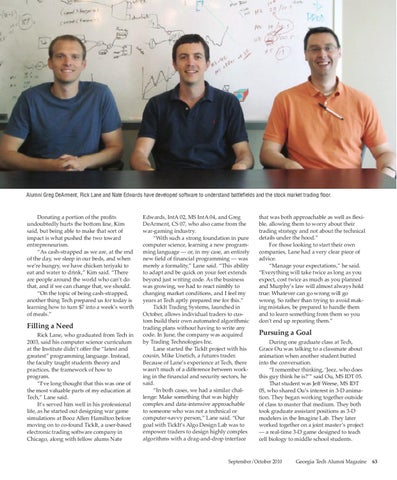FE_Entrepreneur.qxp:Layout 1
8/17/10
1:03 PM
Page 63
Alumni Greg DeArment, Rick Lane and Nate Edwards have developed software to understand battlefields and the stock market trading floor. Donating a portion of the profits undoubtedly hurts the bottom line, Kim said, but being able to make that sort of impact is what pushed the two toward entrepreneurism. “As cash-strapped as we are, at the end of the day, we sleep in our beds, and when we’re hungry, we have chicken teriyaki to eat and water to drink,” Kim said. “There are people around the world who can’t do that, and if we can change that, we should. “On the topic of being cash-strapped, another thing Tech prepared us for today is learning how to turn $7 into a week’s worth of meals.”
Filling a Need
Rick Lane, who graduated from Tech in 2003, said his computer science curriculum at the Institute didn’t offer the “latest and greatest” programming language. Instead, the faculty taught students theory and practices, the framework of how to program. “I’ve long thought that this was one of the most valuable parts of my education at Tech,” Lane said. It’s served him well in his professional life, as he started out designing war game simulations at Booz Allen Hamilton before moving on to co-found TickIt, a user-based electronic trading software company in Chicago, along with fellow alums Nate
Edwards, IntA 02, MS IntA 04, and Greg DeArment, CS 07, who also came from the war-gaming industry. “With such a strong foundation in pure computer science, learning a new programming language — or, in my case, an entirely new field of financial programming — was merely a formality,” Lane said. “This ability to adapt and be quick on your feet extends beyond just writing code. As the business was growing, we had to react nimbly to changing market conditions, and I feel my years at Tech aptly prepared me for this.” TickIt Trading Systems, launched in October, allows individual traders to custom build their own automated algorithmic trading plans without having to write any code. In June, the company was acquired by Trading Technologies Inc. Lane started the TickIt project with his cousin, Mike Unetich, a futures trader. Because of Lane’s experience at Tech, there wasn’t much of a difference between working in the financial and security sectors, he said. “In both cases, we had a similar challenge: Make something that was highly complex and data-intensive approachable to someone who was not a technical or computer-savvy person,” Lane said. “Our goal with TickIt’s Algo Design Lab was to empower traders to design highly complex algorithms with a drag-and-drop interface
that was both approachable as well as flexible, allowing them to worry about their trading strategy and not about the technical details under the hood.” For those looking to start their own companies, Lane had a very clear piece of advice. “Manage your expectations,” he said. “Everything will take twice as long as you expect, cost twice as much as you planned and Murphy’s law will almost always hold true: Whatever can go wrong will go wrong. So rather than trying to avoid making mistakes, be prepared to handle them and to learn something from them so you don’t end up repeating them.”
Pursuing a Goal
During one graduate class at Tech, Grace Ou was talking to a classmate about animation when another student butted into the conversation. “I remember thinking, ‘Jeez, who does this guy think he is?’” said Ou, MS IDT 05. That student was Jeff Weese, MS IDT 05, who shared Ou’s interest in 3-D animation. They began working together outside of class to master that medium. They both took graduate assistant positions as 3-D modelers in the Imagine Lab. They later worked together on a joint master’s project — a real-time 3-D game designed to teach cell biology to middle school students.
September/October 2010
Georgia Tech Alumni Magazine
63
